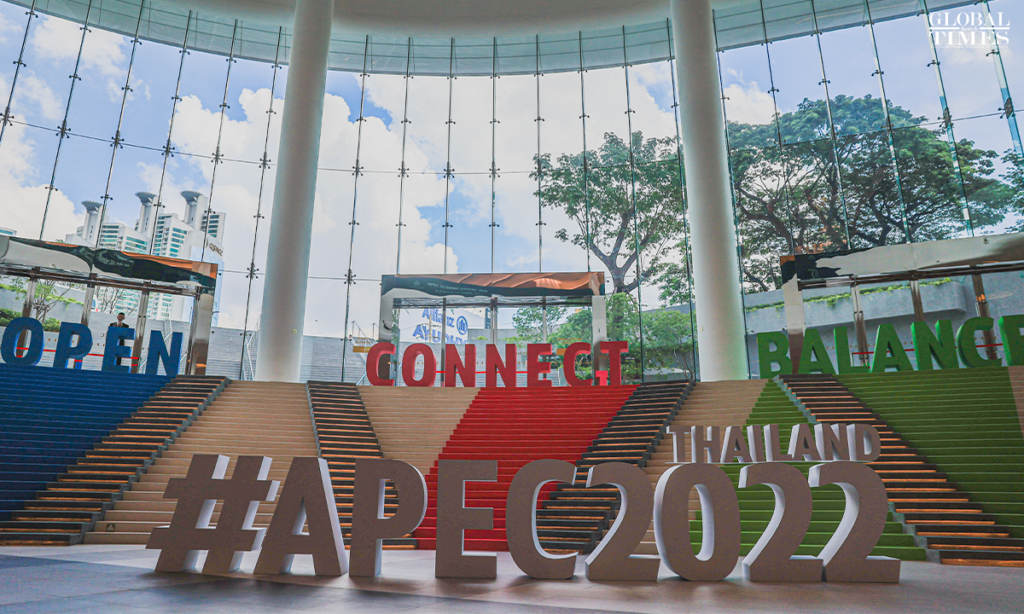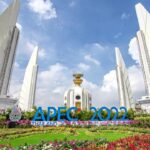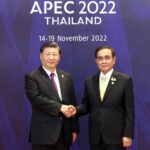The trade bond between China and Thailand is expected to get even closer after the visit of Chinese President Xi Jinping to the nation, observers said, noting that the Regional Comprehensive Economic Partnership (RCEP) free trade deal and a high-speed rail line connecting the two countries, will further accelerate bilateral cooperation.
At the invitation of Prime Minister Prayut Chan-o-cha of the Kingdom of Thailand, Xi arrived in Bangkok on Thursday to attend the 29th APEC Economic Leaders’ Meeting, and President Xi will pay an official visit to Thailand through Saturday.
“The visit is a milestone in guiding and advancing bilateral relations,” Chinese Ambassador to Thailand Han Zhiqiang was cited as saying in a report by the Xinhua News Agency on Thursday.
China and Thailand have a history of thousands of years of friendly exchanges, and the saying “China-Thailand a family” is deeply rooted in the hearts of many people. The two countries joined hands to deal with the pandemic and jointly promoted an economic recovery, Zhao Gancheng, a South Asia expert at the Shanghai Institutes for International Studies, told the Global Times on Thursday.
This year also marks the 47th anniversary of China-Thailand diplomatic ties and the 10th anniversary of the China-Thailand comprehensive strategic cooperative partnership.
“As China’s trade with Thailand, which is a member of the Association of Southeast Asian Nations (ASEAN), has displayed growing momentum after the implementation of the RCEP deal, how to take the already close trade bond to a higher level could be a focus of the talks,” Zhao said.
China has been Thailand’s largest trading partner for nine consecutive years and a major export market for Thailand’s agricultural products. Bilateral trade surged 33 percent year-on-year to reach $131.18 billion in 2021, according to data from Chinese customs.
Regarding connectivity and infrastructure construction, the China-Thailand railway, an important part of the trans-Asia rail network, will be Thailand’s first high-speed railway.
The line will run from Bangkok to the border town of Nong Khai, where a bridge will connect it with the China-Laos Railway, making it possible to travel by train from Bangkok through Laos and then to Kunming in Southwest China’s Yunnan Province.
“The railway will inject vitality into the economic development of regions along the line in Thailand, while push the linking-up of the pan-Asia railway network and promote regional connectivity,” Zhao noted.
Investment and agricultural trade are the areas where the two countries have been enhancing connections in recent years.
“The Chinese market is a large and important one for Thai rice. We anticipate that Chinese people will appreciate and accept Thai rice more than ever, especially jasmine rice (Thai Hommali rice), white rice and healthy rice, and we hope that China can buy more rice from us,” the Thai Rice Exporters Association said in a statement sent to the Global Times on Wednesday.
In the first nine months of this year, Thailand exported 455,318 tons of rice to China, up 30.5 percent year-on-year, worth $219.5 million, up 20 percent year-on-year. Those shipments accounted for 8 percent of Thailand’s total rice export.
In July, Thai Prime Minister Prayut Chan-o-cha invited China to scale up its investment in Thailand, saying the country’s East Economic Corridor is ready for investment by Chinese companies in sectors such as electric cars and agro-industries.
Ambassador Han said that bilateral cooperation in the digital economy, green economy and new energy is now flourishing, noting that China’s 5G technology, e-commerce, electric vehicles and photovoltaic products have boosted Thailand’s “new economy” and are becoming major growth drivers of mutually beneficial cooperation.
China supports Thailand’s important role as the host, and President Xi will put forward China’s solutions and ideas on the development of APEC, the improvement of global governance and economic recovery, said the ambassador.
“In the next step, China will work with ASEAN to implement the RCEP agreement with high quality, seize the opportunities of the digital economy and green economy, promote the construction of the China-ASEAN Free Trade Area 3.0, and build new international land-sea trade channels with more ASEAN members to facilitate the entry of more high-quality products from ASEAN members to the large Chinese market,” Shu Jueting, spokesperson of the Chinese Commerce Ministry, told a press conference in Beijing on Thursday.
(Global Times)




